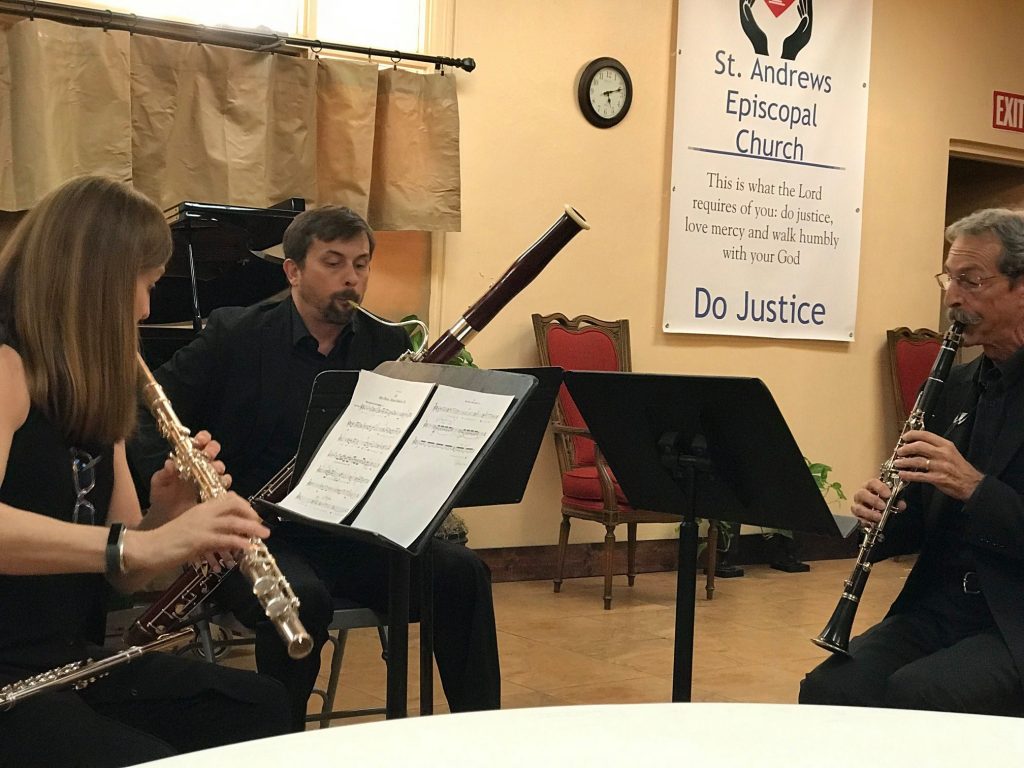
By Dennis Rooney
Zimmermann’s Café Chamber Music is devoted to presenting the music of living composers resident in South Florida. Its biannual concerts are presented in the social room of St. Andrew’s Episcopal Church in Lake Worth, where an audience of somewhere between 50 to 100 people gather at banquet tables to listen to the performances.
The most appealing aspect of these programs seems to be the discussion preceding and following the performances. The composers who are present offer some introductory remarks about their works. Afterward, they and also the performers answer questions or comments from the audience, which evince a wide range of sophistication from simple fandom to questions that delve into aspects of the creative process.
Such two-way discourse is the core appeal of the event. Neither the utilitarian venue, with only adequate acoustics (with no attempt to evoke Gottfried Zimmermann’s coffeehouse in Leipzig where J. S. Bach led the collegium musicum after 1729), nor the free refreshments generously supplied by volunteers can be the draw. Rather, the casual environment and friendly conversations between composers, performers and listeners seem to have done the most to build a faithful audience for the series.
The program for its April 28 concert featured four works. A fifth was announced, for fixed media, but had to be canceled on account of technical difficulties. W-End, a 2018 work for flute and viola by Federico Bonacossa (b. 1977) opened it. In his introduction, the composer pointed out the use of techniques for electronic music such as delay and looping that he employed in this very “acoustic” work of about 10 minutes’ duration.
Those effects were audible as well in microtones and “extended” techniques of tone production in the flute. The active opening material was interspersed with more conventional duet textures and a persistent use of the minor second. Karen Fuller and Felicia Besan were the enterprising flutist and violist, respectively.
Sweet Betrayal, a song cycle setting four poems of Kincie Farrell, written in 2005 by Marlene Woodward-Cooper (b. 1932) was heard next. Both composer and poet were present to introduce it. The cycle takes its title from the third of the settings, preceded by “Oh! Winter Breeze” and “Fantasy,” and concluding with “Sing No More!” Unfortunately, the song texts were not in the printed program.
Despite a light-textured, often arpeggiated piano accompaniment in all but the fourth (where a succession of chords, sometimes repeated, was denser), soprano Kyaunnee Richardson often failed to project her words intelligibly despite displaying an attractive instrument. Pianist Lisa Leonard provided entirely sympathetic support.
Composer Shawn Crouch (b. 1977) introduced two movements from his 95 South, written in 2017 for woodwind trio. They were, he explained, two of the stages of his life lived near to Interstate 95.The first, “Lake Road, Dublin, NH,” evoked a lake at the foot of Mount Monadnock. The mood was primarily pastoral despite some exploration of acrid tone colors.
The second, “Bay Drive, Miami Beach, FL,” did the same for a home of the composer’s in North Beach. The presence of alto flute led a special character, as did some slithering minor seconds. In the excellent ensemble, flutist Karen Fuller was joined by Michael Forte, clarinet; and Gabriel Beavers, bassoon.
Felicia Besan and Lisa Leonard returned to perform the program’s final work, the Sonata for Viola and Piano by Thomas Sleeper (b. 1956), or, more accurately, the second and third movements of that 2018 work. If the composer’s introduction explained why we didn’t hear the first movement, I must have missed it.
Whatever, the second movement, marked “Quasi martial – determined,” seemed to quickly veer off that indication, and the third, titled “St. Vitus,” after the 4th-century Christian martyr who is the patron saint of actors, comedians, dancers, and epileptics, had a restless, jumpy character that was entirely appropriate.